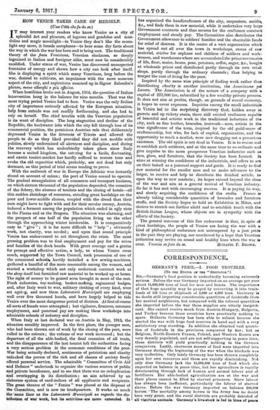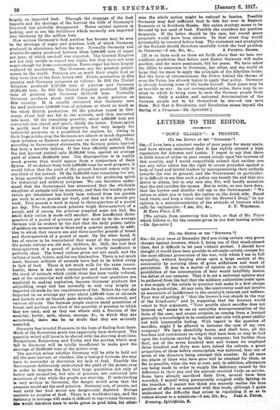CORRESPONDENCE.
GERMANY'S PERIL.—I. FOOD TROUBLES.
(To THE EDITOR OF TIER " SPECTATOR.")
Sue,—Germany's food position is undoubtedly becoming extremely serious. Before the war Germany imported on an average per year about 15,000,000 tons of food for men and beasts. The importance of that huge quantity may be gauged by converting it into train- loads of 150 tons or shiploads of 3,000 or 4,000 tons. Germany is no doubt still importing considerable quantities of foodstuffs from her neutral neighbours, but compared with the colossal quantities she imported before the war these supplies are utterly insignifi- cant. She cannot receive much from Austria-Hungary, Bulgaria, and Turkey because these countries have practically nothing to spare. Hitherto Germany has been able to subsist because she started the war with huge food reserves in hand and with a very satisfactory crop standing. In addition she obtained vast quanti- ties of foodstuffs in the provinces conquered by her; but as Belgium, North-Eastern France, Poland, and Western Russia are very densely populated, and are not self-supporting in peace time, these districts will yield practically nothing to the German conquerors. Lastly, enormous masses of food were imported into Germany during the beginning of the war when the blockade was very ineffective. Only lately Germany has been thrown completely upon her own resources and these are rapidly diminishing. Not only does Germany lack the 15,000,000 tons of food which she imported on balance in peace time, but her agriculture is rapidly deteriorating through lack of human and animal labour and of fertilizers. Her able-bodied agriculturists are at the war and their. places "cannot be filled by starved prisoners. Slave labour has always been inefficient, particularly the labour of starved slaves. Before the war Germany imported on balance 200,000 horses. The mortality among horses in the Army has no doubt been very great, and the rural districts are probably denuded of 1l vigorous animals. Germany's live-stock is fed in time of peace
largely on imported feed. Through the stoppage of the feed imports and the shortage of the harvest the bulk of Germany's live-stock has probably disappeared. Hence animal manure is lacking, and so are the fertilizers which normally are imported into Germany by the million tons.
How serious Germany's food position has become may be seen by the shortage of sugar and potatoes, both of which Germany produced in abundance before the war. Normally Germany and Austria-Hungary produced between them 3,000,000 tons of sugar per year, of which one-half was exported. The Central Empires are not only unable to export any sugar, but they have not even sugar enough for home consumption. Hence sugar has been largely replaced by saccharine. The Germans are the greatest potato- eaters in the world. Potatoes are as much their staple food as they were that of the Irish before 1846. Potato production in this country and Germany compares as follows : In 1912 the United Kingdom produced 5,727,000 tons of potatoes and Germany 50,209,466 tons. In 1913 the United Kingdom produced 7,605,000 tons of potatoes and Germany 54,121,146 tons. Normally Germany produces about eight times as much potatoes as this country. It is usually estimated that Germany uses for seed purposes 5,000,000 tons of potatoes, or about as much as the whole British production. Of the potatoes raised in Ger- many, about half are fed to the animals, and thus converted into meat. Of the remaining quantity, about 4,000,000 tons are converted into starch and spirit, chiefly the latter. Potato-spirit is partly used for drinking purposes, but very largely for industrial purposes, as a propellant for engines, &c. Owing to their huge potato crop the Germans are almost as much dependent upon potatoes as Eastern nations are on rice and millet. Now, according to Government statements, the German potato harvest has been a terrible failure. It has been officially asserted that the last harvest yielded only 20,000,000 tons, against an average yield of almost 50,000,000 tons. The disproportion is in reality much greater than would appear from a comparison of these figures. If we deduct from both 5,000,000 tons for seed purposes, it would follow that the yield of the present harvest comes only to one-third of the normal. Of the 15,000,000 tons remaining for use, a large quantity would probably be needed for producing spirit for industrial and military purposes. We can therefore under- stand that the Government has announced that the wholesale slaughter of animals will be necessary, and that the weekly potato ration per inhabitant has lately been reduced from ten pounds per week to seven pounds per week, and then to five pounds per week. Five pounds a week is equal to three-quarters of a pound per day. Two medium-sized potatoes weigh three-quarters of a pound, and if among the potatoes supplied some are bad, the small daily ration is made still smaller. How insufficient three- quarters of a pound of potatoes per day must bo to the average German will be evident by the fact that the daily potato ration of soldiers on manoeuvres is three and a quarter pounds, in addi- tion to which they receive one and three-quarter pounds of bread and three-quarters of a pound of meat. On the other hand, it has of course to be remembered that many of the recipients of the potato rations are old men, children, &c. Still, the fact that three-quarters of a pound of potatoes is utterly insufficient is perfectly clear. The bread rations given out are small, and the rations of meat, butter, and fat are diminutive. There is not much meat, because millions of animals have had to be killed owing to lack of feed. There is not much milk for the same reason. Lastly, there is not much animal-fat and butter-fat, because the stock of animals which yields these has been vastly reduced, and of the animal-fat and milk-fat produced vast quantities are employed in making explosives, because Germany produces few oil-yielding crops and has normally to rely very largely on imported oil-seeds for her requirements of fat. Before the war she imported on an average per year about 1,600,000 tons of oil-seeds and kernels such as linseed, palm kernels, colza, cotton-seed, and various oil-nuts. The German people receive small quantities of bread, and perhaps one-third of the quantity of potatoes to which they are used; and as they can obtain only a fraction of the meat-fat, butter, milk, cheese, sausage, &c., to which they are accustomed, there sea be no doubt that they are seriously underfed.
Germany has invaded Rumania in the hope of finding food there. Much of the Rumanian grain has apparently been destroyed. The quantity seized will have to be shared with the starving Austrians, Hungarians, Bulgarians, and Turks, and the portion which may fall to Germany will be totally insufficient to make good the shortage of 30,000,000 tons of the potato crop.
The question arises whether Germany will be able to hold out till the next harvest, or whether, like a besieged fortress, she may have to surrender at discretion for lack of food. Possibly the Government deliberately understated the yield of the potato crop in order to disguise the fact that large quantities not only of butter and animal-fat, but also of potatoes, are converted into munitions of war while the people are starving. If underfeeding is very serious in Germany, the danger would arise that the peasants would eat the seed potatoes. Germany can, of course, not wait until her food stores are dangerously depleted. Europe contains no surplus of food. There is a world-shortage, and the deficiency in tonnage will make it difficult to reprovision Germany. She would therefore have to make peace in good time, for other- wise the whole nation might be reduced to famine. Possibly Germany may find sufficient food to tide her over in Eastern Rumania or in Southern Russia. Her entire strategy seems to be directed by her need of food. Possibly she considers her position desperate. If the latter should be the case, her recent peace proposals would have been sincere. In that event they would presumably be renewed before long. The statesmen and strategists of the Entente should therefore carefully watch the food problem [It is on facts such as those set forth above that we base our confident prediction that before next Easter Germany will make another, and far more passionate, bid for peace. We have asked the Allies to announce to Germany, her allies, and the world at large that we mean to apply the principle of the Sibylline books. But the force of circumstances, the Power behind the throne of even the Fates, has already begun to apply that policy. Germany is already burning some of the books herself. Soon peace may be as terrible as war. As our correspondent notes, there may be no ships in which to bring corn to save the German people from famine. Only a sudden and universal determination of the German people not to let themselves be starved can save them. But that is Revolution, and Revolution seems beyond the daring of a Prussian.—ED. Spectator.]











































 Previous page
Previous page